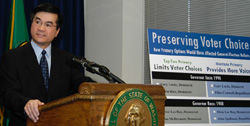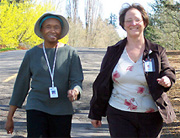
| » News room | » Working Capitol archives |
April 2, 2004
Message from the GovernorWashington voters were served well by our blanket primary for 70 years. Voters were able to protect their privacy, maintain their independence, and exercise greater choice.
 But the Democratic and Republican parties challenged the constitutionality of our primary and prevailed. So during this year's legislative session, we were faced with an urgent need to adopt an effective and constitutional replacement election system for the 2004 September primary election.
But the Democratic and Republican parties challenged the constitutionality of our primary and prevailed. So during this year's legislative session, we were faced with an urgent need to adopt an effective and constitutional replacement election system for the 2004 September primary election. The Legislature passed a bill incorporating two alternatives debated in this year's session: the Montana system and the Louisiana system.
We're not just choosing a primary system. We're choosing an election system for both the September primary and the November general election, where twice as many people participate. The most important issue to consider when choosing an election system is voter choice.
I support the Montana system because it best preserves the greatest voter choice in the November general election. In the Montana system, voters choose among candidates of a single party in the primary election. Their choice of parties is completely confidential. No party registration is required.
| Quote of the Week “For over 100 years in Washington state, we have continually strived to provide the greatest choice for voters in our election system. Signing this bill in its entirety would end this rich tradition. Voters may not be aware of this today. But they would discover it this November. And they would be very disappointed.” -Governor Locke, April 1, 2004, on the primary election bill |
The so-called “top-two primary,” modeled after the Louisiana election system, advances only the two candidates with the most votes from the primary to the general election. It virtually eliminates minor-party candidates from participating in the November election, and makes it highly likely that two candidates from the same party will sometimes be the only candidates left after the primary.
This system does not preserve voter choice in the November general election. The Louisiana system shifts the most important election decisions to the primary, when turnout is a fraction of the participation in the general election.
Given the much larger turnout in the November general elections, it makes more sense to provide the greatest number of choices in November. We shouldn't move the most significant decisions for voters to a time when participation is lowest-the September primary. And under the top-two system parties would almost certainly resort to nominating their candidates through caucuses or conventions. This means even fewer people would have input into the selection of party nominees.
The political parties have said they will promptly challenge the Louisiana system in federal court if it is adopted. That means that this fall our state could easily be left without a primary system that provides for voter choice and privacy. We could end up instead with a primary designed by the political parties and a federal judge.
The bill passed by the Legislature effectively required that I choose between the two systems in the bill. And I believe the Montana system is a better system. Accordingly, yesterday I vetoed the sections of the bill that enact the Louisiana primary and reduce choices in the November general election. And I signed the remainder of the bill, enacting a Montana election system.
I made this decision with the best interests of Washington voters in mind. The Montana system best protects voters' choice, privacy and independence.
Sincerely,
Gary Locke
Governor
News Highlights
Funding Our Most Important Priorities
| Governor's Priorities |
“Thousands of college-bound kids currently in high school classrooms across Washington have a brighter future today,” the Governor said when signing the budget. The Governor won $17 million to finance up to 3,000 new enrollment slots at state colleges and universities, with about one-third of the increase in high-demand fields such as information technology, nursing and engineering. “When we strengthen our ability to give our kids a college education, we also strengthen our economy,” the Governor added. “You can't have a growing, thriving economy today without providing an educated, skilled workforce. Our state businesses demand it. Educated citizens are the key to a strong economy.”
Protecting the Environment
Governor Locke signed several bills that will help avoid environmental damage from carbon dioxide, stormwater runoff and oil spills on March 31. Among the legislation the Governor signed was a bill to mitigate carbon dioxide emissions by requiring new power plants to offset 20 percent of the carbon dioxide (CO2) the plants release. The standards are the strongest in nation for new power plants. “This legislation is a winner both for the environment and businesses,” the Governor said. “Having clear standards in place will decrease CO2 emissions that lead to global warming, create more certainty for businesses, decrease rulemaking costs, and speed up permitting processes by as much as a year.”
The Governor also signed bills to improve regulation of stormwater runoff, protect our waters from disastrous oil spills and invasive species and ensure that sound scientific data is used in water quality standard-setting.
Driver License Renewal on the Web
Governor Locke signed a bill he championed Wednesday that includes funding for the state Department of Licensing to allow citizens to renew their driver license online or by mail. The system is expected to be up and running by October. “This is real government service-harnessing technology to make state government even more responsive to its citizens,” the Governor said. “Soon, they will be able to take care of this task from the comfort of their homes, 24 hours a day, seven days a week.” This online service reinforces the state's leadership role in offering vital services to citizens via the Internet and by phone. Washington has been repeatedly recognized as the No. 1 digital state government in the nation.
Keeping Washington Healthy
 Governor Locke has declared April 5-11 as Public Health Week in Washington. This recognition provides an opportunity to highlight the work people do in public health to help make our state a healthy place to live, work and play. This year's theme is “Eliminating Health Disparities.” The state Department of Health will profile some of its employees and their work on its Web site during the month of April. These people are great examples of the interesting, important and varied work of public health workers and how it affects the lives of the citizens of our state.
Governor Locke has declared April 5-11 as Public Health Week in Washington. This recognition provides an opportunity to highlight the work people do in public health to help make our state a healthy place to live, work and play. This year's theme is “Eliminating Health Disparities.” The state Department of Health will profile some of its employees and their work on its Web site during the month of April. These people are great examples of the interesting, important and varied work of public health workers and how it affects the lives of the citizens of our state. Upcoming Events
4/7: Weekly News Conference, Olympia
4/8: Luncheon to Celebrate 10th Anniversary of Naval Station Everett, Everett
Legal Notice:
Nothing in this publication does, or is intended to, assist, promote or oppose any ballot proposition or campaign for elective office. The purpose of this publication is to improve the executive management of state government through enhanced communication of the administration's plans, objectives and accomplishments to state employees and members of the public who have requested this public information by subscribing.
Nothing in this publication does, or is intended to, assist, promote or oppose any ballot proposition or campaign for elective office. The purpose of this publication is to improve the executive management of state government through enhanced communication of the administration's plans, objectives and accomplishments to state employees and members of the public who have requested this public information by subscribing.
| » News room | » Working Capitol archives |
Home
Governor Locke
- About the Governor
- Cabinet
- Senior Staff
- Executive Orders
- Proclamations
- Boards and Commissions
- Contact the Governor
The First Lady
News Room
About Washington
- Washington State Facts
- Photo Gallery
- The 50 State QuartersTM Program
- State Legislature
- Washington Courts
- US Census 2000
- Register to Vote